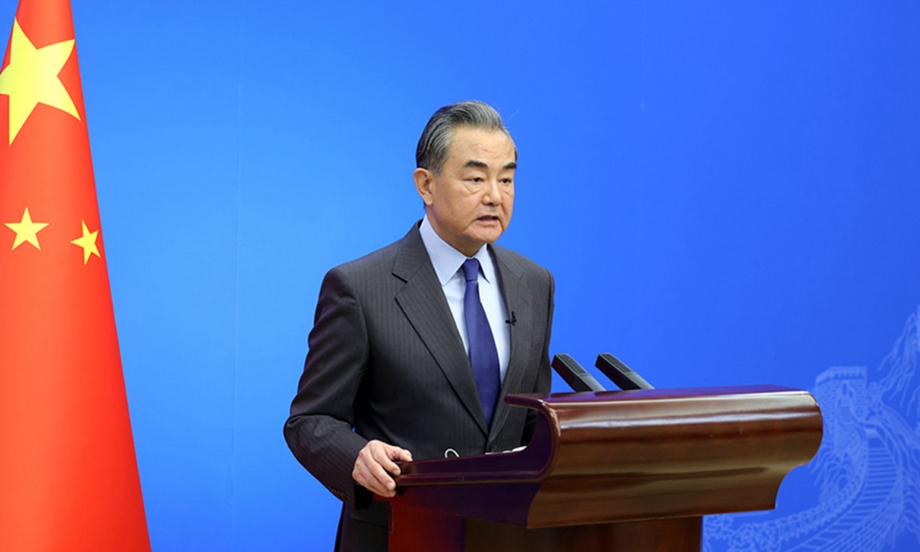What China brings to Munich Security Conference will be fundamental solution

Wang Yi at the symposium on the international situation and China's foreign relations on December 25, 2022. Photo: Ministry of Foreign Affairs
Wang Yi, a member of the Political Bureau of the CPC Central Committee and Director of the Office of the Central Commission for Foreign Affairs, will visit France, Italy, Hungary and Russia from February 14 to 22. He will also attend the 59th Munich Security Conference (MSC) and deliver a speech at the China session. During his trip, Wang will hold meetings with leaders of multiple countries. He is the highest-ranking Chinese official to visit Europe since the 20th CPC National Congress. The outside world and international public opinion are paying close attention to this trip.
The MSC focuses on Europe, themed on regional security. Traditionally, the MSC's agenda focuses on transatlantic partnership, and it is often regarded as an important platform to demonstrate Western solidarity, therefore it is also called the "transatlantic family meeting." A special feature of this year's MSC is that it is being held right before the first anniversary of the outbreak of the Russia-Ukraine conflict. When the MSC concluded last year, there had been no gunshots at the Ukraine-Russia border, and most Europeans did not believe military conflicts would return to Europe. For them, the world has changed a lot in the past year.
In order to avoid becoming a forum for internal exchanges between Europe and the US, the MSC this year has invited more delegations from emerging economies to participate in the conference. The report before the meeting revealed that MSC aims to "contribute to the peaceful resolution of conflicts." This should be the real thinking of the organizers. At the same time, it also conveyed the voice of hoping to be an occasion for China-US dialogue rather than confrontation. It should be said that this is in line with China's consistent position. China participates in the MSC with goodwill of peace and sincerity of cooperation, which reflects the mission and open-mindedness driven by the sense of responsibility of a major country.
Leaders of more than 40 countries and more than 90 ministerial officials will attend MSC this year. The international mainstream media set up their cameras early and waited for them. They pay special attention to two things: First, what views will the Chinese delegation expresses on major security issues of general international concern. Second, which countries will Chinese side interact with and will they meet with delegates of the US? To some extent, the expectation for a meeting between Chinese and American delegates in Munich is also a projection of European uncertainty about the security situation on China-US relations, and behind it is the expectation that China-US relations will stabilize.
The question is, will the US act as what Europe wants? As MSC's long-time spoiler, the US is increasingly showing a tendency to overwhelm the host. The outside world has noticed that the US and NATO want to turn the MSC into a self-talking, self-fulfilling internal meeting of the Western world. Different from an ideological preaching and hegemonic intimidation against non-Western countries, Europe has its own views and position on MSC, as well as the international security situation and governance system.
Judging from past experience, Chinese delegate's expression on China's position on major international issues at the MSC were widely heard and often received a lot of understanding and support. The sharp decline in the security situation in Europe over the past year has further proved the great value of Global Security Initiative proposed by China. Insisting on the security concept that is common, comprehensive, cooperative and sustainable is a fundamental solution to solving the security dilemma in Europe. It believes Europeans can see this as long as they are not biased. It is conceivable that, against this special background, China's voice at the MSC this year will receive more attention. Such direct communication and exchange will help to enhance trust and dispel misgivings between China and the West.
The Russia-Ukraine conflict has lasted for a year, and to be honest, all parties are exhausted as Europeans are yearning for peace. While the US continues to fuel the flames, China has always held high the banner of promoting peace and facilitating talks. China and Europe share common interests and language in this regard. Against the background of US' continuous pressure piled on Europe, for the Chinese delegation, what awaits them may not necessarily be all flowers and red carpets, to which we have a clear understanding. But China still sent senior diplomats to visit Europe and participate in the conference, which is enough to show our strategic courage and strategic steadiness, as well as the determination to advance cooperation through talks. No matter how the US sow discord, China and Europe have broad convergence of interests. It is an objective reality that cannot be changed or avoided.
If Europe really wants to turn the MSC to an event that promotes peace and solve conflict, then they must pay real attention to the voices of Chinese delegation and pragmatically conduct dialogue with Chinese side. China and Europe share many similar views on international order, and there is no fundamental conflict of interest. Empowering China-Europe relations the maximum lasting strength to resist external interference is particularly important to both China-Europe ties and the whole world.








